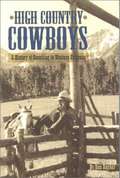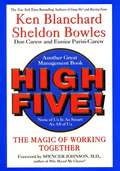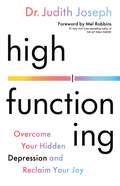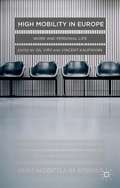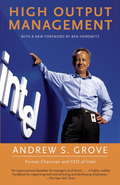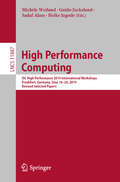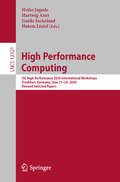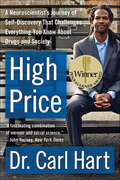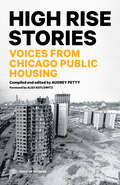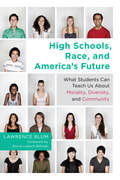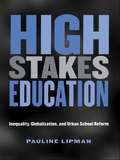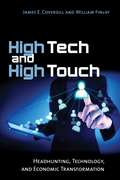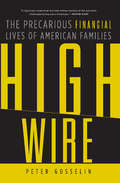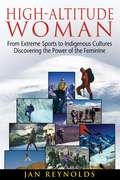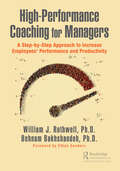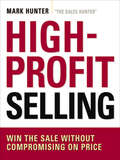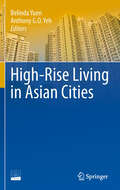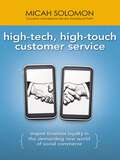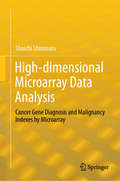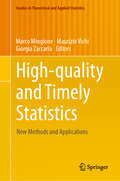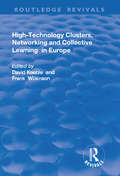- Table View
- List View
High Country Cowboy
by Sandra MooreLife was tough for the western Colorado Cowboy. He faced a set of challenges that were totally different from his counterpart in Texas or even those brave men who worked on the open plains of eastern Colorado. Deep snows made it necessary to keep the cattle at lower elevations in the winter yet drought required they be driven back to the high country in the summer. A variety of predators could quickly disappear into the rugged countryside. Newborn calves might never be found. High water from spring runoffs or sudden mountain cloudbursts were also a problem. But the largest challenge came from the terrain-steep mountain gullies and high mountain peaks could not only kill a cow but often kept them from being found. Ken Reyher has done a marvelous job of bringing this dangerous and unique life to light. He comes by it naturally, having been raised by a ranching family. He has worked as a history teacher and a crop duster pilot. Besides history, he loves to write cowboy poetry. His work has appeared in many national and local publications. He has written two other books published by Western Reflections-Antoine Robidoux and Fort Uncompahgre and Silver and Sawdust.
High Five!: The Magic Of Working Together
by Sheldon Bowles Ken Blanchard Eunice Parisi-Carew Don CarewHigh Five! combines the spellbinding charm of a timeless parable with cutting-edge information about why teams are important and what individuals and organizations can do to build successful ones. Through the story of Alan Foster, a workplace one-man band, High Five! identifies the four key ingredients of winning teams. Although Alan is an effective producer, he is unwilling to share the spotlight by partnering on projects and is fired because, as his boss puts it, "Alan, we need good producers who are good team players, too. " It is a bitter pill for him to swallow. While mulling over his disappointment, he takes his son to his grade-five hockey practice, where it is clear that his son's team, the Riverbend Warriors, knows nothing about teamwork, either. When the team's two overworked coaches learn of Alan's plight, they persuade him to join their ranks, and he finds himself charged with teaching himself and the players the meaning of teamwork. With the help of a woman friend-a former girls' basketball coach who has "won more high school basketball championships than anyone"-Alan and the Warriors learn the magic of teamwork and that "none of us is as smart as all of us. " With its simple style and easy-to-follow techniques, High Five! is a must-read for anyone seeking to learn the value and power of teamwork.
High Functioning: Overcome Your Hidden Depression and Reclaim Your Joy
by Judith JosephThe first book to unmask the hidden face of depression. If you look fine on the outside but don't feel fine on the inside, learn five tools to break the cycle of High Functioning Depression and experience more joy in your life. Are you going through a period in your life when things feel &“off&”? Do you struggle to find joy in happy moments? Are you walking around feeling numb? Do you feel restless when you aren&’t busy or empty when you are sitting still? We all know what can&’t-get-out-of-bed depression looks like. But there&’s another, lesser-known side of depression that is hidden. Those of us with High-Functioning Depression (HFD) usually don&’t act the way we think a depressed person might. On the surface, we seem fine: We are succeeding at work, pulling our weight at home, and carrying on with our typical social life. Yet behind that mask of productivity we are barely surviving, and certainly not thriving. And we may have no idea why, or what to do about it. In High Functioning, Dr. Judith Joseph draws on original research, client cases, and her own personal struggles with HFD to demystify this poorly understood condition. Her five simple tools—the Five V&’s—will help you understand the science of your happiness and empower you to reclaim your life and joy. •Validation: Acknowledge and accept your emotions about past traumas and present pain •Venting: Let out the frustrations and anxious energy bottled up inside •Values: Identify the purpose and priorities that matter most •Vitals: Slow down to listen to your brain and body and monitor the six vital signs of emotional functioning •Vision: Plan for and celebrate successes, milestones, and everyday joy By following the Five V&’s, we can put an end to self-sacrificing and self-sabotaging, calm our inner turmoil, and go from merely functioning to truly living.
High Ideals and Noble Intentions
by Peter R. ElsonThe relationships between governments and the voluntary sector in Canada are long-standing and complex. Beginning with an historical overview of developments in voluntary sector-government relations from 1600 to 1930, High Ideals and Noble Intentions goes on to explore more recent events and to bring present day policy and practice into focus.Peter R. Elson examines critical historical events in the relationship between the federal government and the voluntary sector which continue to exert their influence. He demonstrates through in-depth case studies that these events are critical to understanding contemporary voluntary sector-government relations. Elson explores the impact of the regulation of charities based on amendments to the 1930 Income War Tax Act; the shift from citizen-based program funding to service-based contract funding in the mid-1990s; and advocacy regulation changes in the 1980s. Elson's case is strengthened by an important and timely comparison between voluntary sector and central government relations in Canada and England. This historically informed comparative analysis provides the basis for practical recommendations meant to improve the future of voluntary sector-government relations across Canada.
High Mobility in Europe: Work And Personal Life
by Gil Viry Vincent KaufmannTravelling intensively to and for work helps but also challenges people to find ways of balancing work and personal life. Drawing on a large European longitudinal study, Mobile Europe explores the diversity and ambivalence of mobility situations and the implications for family and career development.
High Output Management
by Andrew S. GroveThe essential skill of creating and maintaining new businesses—the art of the entrepreneur—can be summed up in a single word: managing. In High Output Management, Andrew S. Grove, former chairman and CEO (and employee number three) of Intel, shares his perspective on how to build and run a company. Born of Grove’s experiences at one of America’s leading technology companies, this legendary management book is a Silicon Valley staple, equally appropriate for sales managers, accountants, consultants, and teachers, as well as CEOs and startup founders. Grove covers techniques for creating highly productive teams, demonstrating methods of motivation that lead to peak performance—throughout, High Output Management is a practical handbook for navigating real-life business scenarios and a powerful management manifesto with the ability to revolutionize the way we work.From the Trade Paperback edition.
High Performance Computing: ISC High Performance 2019 International Workshops, Frankfurt, Germany, June 16-20, 2019, Revised Selected Papers (Lecture Notes in Computer Science #11887)
by Guido Juckeland Michèle Weiland Sadaf Alam Heike JagodeThis book constitutes the refereed post-conference proceedings of 13 workshops held at the 34th International ISC High Performance 2019 Conference, in Frankfurt, Germany, in June 2019: HPC I/O in the Data Center (HPC-IODC), Workshop on Performance & Scalability of Storage Systems (WOPSSS), Workshop on Performance & Scalability of Storage Systems (WOPSSS), 13th Workshop on Virtualization in High-Performance Cloud Computing (VHPC '18), 3rd International Workshop on In Situ Visualization: Introduction and Applications, ExaComm: Fourth International Workshop on Communication Architectures for HPC, Big Data, Deep Learning and Clouds at Extreme Scale, International Workshop on OpenPOWER for HPC (IWOPH18), IXPUG Workshop: Many-core Computing on Intel, Processors: Applications, Performance and Best-Practice Solutions, Workshop on Sustainable Ultrascale Computing Systems, Approximate and Transprecision Computing on Emerging Technologies (ATCET), First Workshop on the Convergence of Large Scale Simulation and Artificial Intelligence, 3rd Workshop for Open Source Supercomputing (OpenSuCo), First Workshop on Interactive High-Performance Computing, Workshop on Performance Portable Programming Models for Accelerators (P^3MA). The 48 full papers included in this volume were carefully reviewed and selected. They cover all aspects of research, development, and application of large-scale, high performance experimental and commercial systems. Topics include HPC computer architecture and hardware; programming models, system software, and applications; solutions for heterogeneity, reliability, power efficiency of systems; virtualization and containerized environments; big data and cloud computing; and artificial intelligence.
High Performance Computing: ISC High Performance 2020 International Workshops, Frankfurt, Germany, June 21–25, 2020, Revised Selected Papers (Lecture Notes in Computer Science #12321)
by Guido Juckeland Heike Jagode Hatem Ltaief Hartwig AnztThis book constitutes the refereed post-conference proceedings of 10 workshops held at the 35th International ISC High Performance 2020 Conference, in Frankfurt, Germany, in June 2020: First Workshop on Compiler-assisted Correctness Checking and Performance Optimization for HPC (C3PO); First International Workshop on the Application of Machine Learning Techniques to Computational Fluid Dynamics Simulations and Analysis (CFDML); HPC I/O in the Data Center Workshop (HPC-IODC); First Workshop \Machine Learning on HPC Systems" (MLHPCS); First International Workshop on Monitoring and Data Analytics (MODA); 15th Workshop on Virtualization in High-Performance Cloud Computing (VHPC). The 25 full papers included in this volume were carefully reviewed and selected. They cover all aspects of research, development, and application of large-scale, high performance experimental and commercial systems. Topics include high-performance computing (HPC), computer architecture and hardware, programming models, system software, performance analysis and modeling, compiler analysis and optimization techniques, software sustainability, scientific applications, deep learning.
High Price: A Neuroscientist's Journey of Self-Discovery That Challenges Everything You Know About Drugs and Society
by Carl HartHigh Price is the harrowing and inspiring memoir of neuroscientist Carl Hart, a man who grew up in one of Miami’s toughest neighborhoods and, determined to make a difference as an adult, tirelessly applies his scientific training to help save real lives. Young Carl didn't see the value of school, studying just enough to keep him on the basketball team. Today, he is a cutting-edge neuroscientist—Columbia University’s first tenured African American professor in the sciences—whose landmark, controversial research is redefining our understanding of addiction.In this provocative and eye-opening memoir, Dr. Carl Hart recalls his journey of self-discovery, how he escaped a life of crime and drugs and avoided becoming one of the crack addicts he now studies. Interweaving past and present, Hart goes beyond the hype as he examines the relationship between drugs and pleasure, choice, and motivation, both in the brain and in society. His findings shed new light on common ideas about race, poverty, and drugs, and explain why current policies are failing.
High Rise Stories
by Audrey PettyIn the gripping first-person accounts of High Rise Stories, former residents of Chicago's iconic public housing projects describe life in the now-demolished high-rises. These stories of community, displacement, and poverty in the wake of gentrification give voice to those who have long been ignored, but whose hopes and struggles exist firmly at the heart of our national identity.
High Schools, Race, and America's Future: What Students Can Teach Us About Morality, Diversity, and Community
by Gloria Ladson-Billings Lawrence BlumIn High Schools, Race, and America's Future, Lawrence Blum offers a lively account of a rigorous high school course on race and racism. Set in a racially, ethnically, and economically diverse high school, the book chronicles students' engagement with one another, with a rich and challenging academic curriculum, and with questions that relate powerfully to their daily lives. Blum, an acclaimed moral philosopher whose work focuses on issues of race, reflects with candor, insight, and humor on the challenges and surprises encountered in teaching--the unexpected turns in conversation, the refreshing directness of students' questions, the "aha" moments and the awkward ones, and the paradoxes of his own role as a white college professor teaching in a multiracial high school classroom. High Schools, Race, and America's Future provides an invaluable resource for those who want to teach students to think deeply and talk productively about race.
High Schools, Race, and America's Future: What Students Can Teach Us About Morality, Diversity, and Community
by Lawrence BlumIn High Schools, Race, and America&’s Future, Lawrence Blum offers a lively account of a rigorous high school course on race and racism. Set in a racially, ethnically, and economically diverse high school, the book chronicles students&’ engagement with one another, with a rich and challenging academic curriculum, and with questions that relate powerfully to their daily lives. Blum, an acclaimed moral philosopher whose work focuses on issues of race, reflects with candor, insight, and humor on the challenges and surprises encountered in teaching—the unexpected turns in conversation, the refreshing directness of students&’ questions, the &“aha&” moments and the awkward ones, and the paradoxes of his own role as a white college professor teaching in a multiracial high school classroom. High Schools, Race, and America&’s Future provides an invaluable resource for those who want to teach students to think deeply and talk productively about race.
High Stakes Education: Inequality, Globalization, and Urban School Reform (Critical Social Thought)
by Pauline LipmanNoted scholar Pauline Lipman explores the implications of education accountability reforms, particularly in urban schools, in the current political, economic, and cultural context of intensifying globalization and increasing social inequality and marginalization along lines of race and class.
High Tech Heretic: Why Computers Don't Belong in the Classroom and Other Reflections by a Computer Contrarian
by Clifford StollInteresting analysis of the use and misuse of technology in education.
High Tech and High Touch: Headhunting, Technology, and Economic Transformation
by James E. Coverdill William FinlayIn High Tech and High Touch, James E. Coverdill and William Finlay invite readers into the dynamic world of headhunters, personnel professionals who acquire talent for businesses and other organizations on a contingent-fee basis. In a high-tech world where social media platforms have simplified direct contact between employers and job seekers, Coverdill and Finlay acknowledge, it is relatively easy to find large numbers of apparently qualified candidates. However, the authors demonstrate that headhunters serve a valuable purpose in bringing high-touch search into the labor market: they help parties on both sides of the transaction to define their needs and articulate what they have to offer.As well as providing valuable information for sociologists and economists, High Tech and High Touch demonstrates how headhunters approach practical issues such as identifying and attracting candidates; how they solicit, secure, and evaluate search assignments from client companies; and how they strive to broker interactions between candidates and clients to maximize the likelihood that the right people land in the right jobs.
High Wire: The Precarious Financial Lives of American Families
by Peter GosselinPeter Gosselin predicted in High Wire that the American worker would take on an exceedingly high level of risk in the American economy, and would be ever more exposed to the volatility of the market. Today, Gosselin's worst fears have been realized. American families are walking a high wire in which a medical crisis, a natural disaster, or the loss of a job could send them into free fall. And as the housing crisis worsens and banks and insurers collapse, many have already fallen. High Wire reveals the quiet corrosion of American living standards and shows how the "ownership society" has turned into the "on-your-own society"-with devastating consequences.
High-Altitude Woman: From Extreme Sports to Indigenous Cultures—Discovering the Power of the Feminine
by Jan ReynoldsOne of the first female extreme athletes reflects on how her feminine strengths led to her success in a male-dominated field • Written by Jan Reynolds, medal winner in World Cup biathlon and former world record-holder for women’s high-altitude skiing • Recounts many of Reynolds’ adventures, including her Mount Everest expeditions • Explains how she didn’t simply emulate the men around her but embraced her feminine strengths of compassion, mediation, cooperation, and observation • Shares insights from her immersion in several indigenous cultures, where she identified gender traits found in all cultures World record-breaking skier and climber Jan Reynolds has sought adventure in the Himalayas, the Southern Alps, the Sahara Desert, the Canadian Arctic, and the Amazon Basin--often as the only woman in her expedition. Tasked time and again with having to prove herself in the company of men, her tireless dedication on each high-risk excursion opened the door for many of today’s female extreme athletes. Recounting in vivid detail many of her adventures, including multiple Mount Everest expeditions, Reynolds explains that her success on each formidable journey didn’t arise simply by emulating the men around her but by embracing her feminine strengths of compassion, mediation, cooperation, and observation. As she traveled the world, she broadened her insights into the psychologies of men and women with her immersion in several indigenous cultures, such as the ancient salt traders of Tibet, where she identified gender traits and strengths found in all cultures. Providing a guide for women entering male-dominated fields, Reynolds explains how women as well as men should nurture their feminine assets for more successful relationships at work, at play, at home, and in our global relationship with the natural world.
High-Performance Coaching for Managers: A Step-by-Step Approach to Increase Employees' Performance and Productivity
by William J. Rothwell Behnam BakhshandehCoaching is a necessary skill for managers. It is important as a fundamental part of an organization's talent efforts—including talent acquisition, development and retention strategies. For a coaching program to succeed in an organization, it should be recognized as a useful approach throughout the organization and become part of the fabric of the corporate culture. Performance Coaching for Managers provides an important tool for organizations to use to train their managers on coaching. This book differs significantly from other books in the coaching market. Many books on coaching cast coaches as facilitators who questions their clients (the coachees), helping them to articulate their own problems, formulate their own solutions, develop their own action plans to solve problems, and measure the success of efforts to implement those plans. That is called a nondirective approach. But this book adopts a directive approach by casting the coach as a manager who diagnoses the problems with worker job performance and offers specific advice on how to solve those problems. While there is nothing wrong with a nondirective approach, it does not always work well in job performance reviews in which the manager must inform the worker about gaps between what is needed (the desired) and what is performed (the actual). The significant difference between what is currently available in the market and what we are offering in Performance Coaching is the authors' collective experience of over 70 combined years of hands-on research and delivery experiences in the Human Resources Development field. According to the Harvard Business Review (2015), workers generally expect their immediate supervisors to give them honest feedback on how well they do their jobs—and specific advice on what to do if they are not performing in alignment with organizational expectations. When workers do not receive advice—but instead are questioned about their own views—they regard their managers as either incompetent or disingenuous. Effective managers should be able to offer direction to their employees. After all, managers are responsible for ensuring that their organizational units deliver the results needed by the organization. If they fail to do that, the organization does not achieve its strategic goals. This book gives managers direction in how to offer directive coaching to their workers.
High-Performance Teams: The Katzenbach-Smith Collection (2 Books)
by Jon R. Katzenbach Douglas K. SmithTeams are fast becoming a flexible and efficient way to enhance organizational performance. This Harvard Business Review collection brings together the ideas and research from Jon Katzenbach and Douglas Smith, who argue that we cannot meet the challenges ahead, from total quality to customer service to innovation, without teams. This collection includes The Wisdom of Teams and The Discipline of Teams.
High-Profit Selling: Win the Sale Without Compromising on Price
by Mark HunterThis book teaches salespeople to rethink their approach to sales goals--so they not only sell a greater quantity but sell with the bottom line in mind.In the high-pressure quest to make a sale, acquire a contract, and beat out other bidders, sales professionals frequently resort to short-term strategies like cutting prices, offering discounts, or making other concessions. By explaining how short-term strategies are destructive to the long-term sustainability of a business, High-Profit Selling helps salespeople instead focus their energy on &“profit sales&” that successfully execute product price increases while maintaining and strengthening current customer relationships.In this invaluable resource, you&’ll learn:how to avoid negotiating, actively listen to customers,match the benefits of products or services with customers&’ needs and pains,confidently communicate value,and ensure prospects are serious and not shopping for price.Too many salespeople believe that a sale at any price is better than no sale at all. High-Profit Selling teaches them to do away with this logic and instead make sales that satisfy and add value to both the client and company.
High-Rise Living in Asian Cities
by Anthony G.O. Yeh Belinda YuenThis book is intended to fill a knowledge gap in the study of contemporary high-rise living. While there has been much documentation on the engineering and technological aspects of tall buildings, relatively little has been written about the social and livability of high-rise. Much less is written about Asian cities even though Asia is the current hotbed of high-rise development. Even though traditional discourse of high-rise housing is not always positive, new forces are redefining its place in 21st century urbanity. Many cities around the world are reembracing high-rise in urban agenda under current narrative of sustainable development. High-rise is fast becoming a priority area in international research agenda. The quest is for livable and sustainable high-rise development. Against the background of current trends--globalization, urbanization, mixed-use development, and new-built taller buildings in inner city areas in both developed and developing countries, this book examines the software: design, economics, estate management, legal and property rights, physical environment, planning, community development, and social dimensions of high-rise living. Analysis is with the widely acclaimed successful high-rise public housing in Hong Kong and Singapore to understand the advantages and worries of high-rise living, and to distill the key points and lessons in the making of a 'good' highrise living environment. Hong Kong and Singapore have been constructing high-rise for more than four decades each. The majority of their population has moved to live in high-rise, selecting to live high-rise, and registering consistently high residential satisfaction. The height of apartment buildings in both cities continues to rise. The tallest is anticipated to be 70-storey. It is the contention of this book that contrary to earlier common negative discourses on public high-rise living, the high-rise environment may yet offer urban residents a satisfying dwelling experience. Leading housing academics, researchers and practitioners in the two cities have contributed to this book. This book presents a timely contribution to our understanding of a widening urban phenomenon that will affect a growing number of the world's population.
High-Tech, High-Touch Customer Service: Inspire Timeless Loyalty in the Demanding New World of Social Commerce
by Micah SolomonTwitter, smartphones, and self-service kiosks are taking over, and tech-savvy business dealings are no longer an advantage--they’re a requirement. With entertaining humor and inarguable logic, author Micah Solomon offers surefire strategies for success by exploring the timelessness of customer service (i.e., what hasn’t changed), the high-tech tools that could give you a customer service advantage, and the systemic social shifts that are changing your customer’s expectations of the way you do business. You’ll learn inside secrets of wildly successful customer service initiatives, from internet startups to venerable brands, and how to turn casual customers into fervent supporters who will spread the word far and wide--online and off. High-Tech, High-Touch Customer Service does this by teaching readers the six major customer trends and what they mean for business; the eight unbreakable rules for social media customer service; how to effectively address online complainers and saboteurs on Yelp, Twitter, TripAdvisor, and other forums; how to understand and leverage the rising power of self-service; and how to build a company culture that breeds stellar customer service.With special features including lessons from the latest newsworthy customer service blunders, you’ll be equipped to retool old-fashioned customer service and turn time-strapped, screen-addicted, value-savvy, and socially engaged critics into fervent loyal customers who help your business thrive.
High-dimensional Microarray Data Analysis: Cancer Gene Diagnosis and Malignancy Indexes by Microarray
by Shuichi ShinmuraThis book shows how to decompose high-dimensional microarrays into small subspaces (Small Matryoshkas, SMs), statistically analyze them, and perform cancer gene diagnosis. The information is useful for genetic experts, anyone who analyzes genetic data, and students to use as practical textbooks.Discriminant analysis is the best approach for microarray consisting of normal and cancer classes. Microarrays are linearly separable data (LSD, Fact 3). However, because most linear discriminant function (LDF) cannot discriminate LSD theoretically and error rates are high, no one had discovered Fact 3 until now. Hard-margin SVM (H-SVM) and Revised IP-OLDF (RIP) can find Fact3 easily. LSD has the Matryoshka structure and is easily decomposed into many SMs (Fact 4). Because all SMs are small samples and LSD, statistical methods analyze SMs easily. However, useful results cannot be obtained. On the other hand, H-SVM and RIP can discriminate two classes in SM entirely. RatioSV is the ratio of SV distance and discriminant range. The maximum RatioSVs of six microarrays is over 11.67%. This fact shows that SV separates two classes by window width (11.67%). Such easy discrimination has been unresolved since 1970. The reason is revealed by facts presented here, so this book can be read and enjoyed like a mystery novel. Many studies point out that it is difficult to separate signal and noise in a high-dimensional gene space. However, the definition of the signal is not clear. Convincing evidence is presented that LSD is a signal. Statistical analysis of the genes contained in the SM cannot provide useful information, but it shows that the discriminant score (DS) discriminated by RIP or H-SVM is easily LSD. For example, the Alon microarray has 2,000 genes which can be divided into 66 SMs. If 66 DSs are used as variables, the result is a 66-dimensional data. These signal data can be analyzed to find malignancy indicators by principal component analysis and cluster analysis.
High-quality and Timely Statistics: New Methods and Applications (Studies in Theoretical and Applied Statistics)
by Maurizio Vichi Marco Mingione Giorgia ZaccariaThis book addresses a wide range of recent methodological aspects, applications and best practices of statistics production. It comprises a selection of peer-reviewed contributions of methodological and applied interest presented at the 4th Conference of European Statistics Stakeholders, CESS 2022, held in Rome, Italy, on October 20-21, 2022. The first part discusses statistical methods with applications to environmental risk assessment, sentinels data, surveillance systems during the Covid-19 pandemic, healthcare risk management, the analysis of regional or structural changes of scale, household distributional accounts, regional rental prices on municipalities, the network topology of the Euro area interbank market, tourism statistics and big data, statistical literacy, and Sustainable Development Goal composite indicators for EU countries. The second part focuses on statistical methodologies for complex data analysis, namely the optimal number of clusters to rank a model-based index, clustering methods for asymmetric data using spectral approaches, a family of parsimonious matrix-variate mixture models for heavy-tailed data, the importance of robust second-stage regressions for financial data, and on perturbation methods. In view of the overarching theme “The European Data Ecosystem for the Statistical Information of the Digital Age” and the importance of statistical data for monitoring the progress of the United Nations’ Sustainable Development Goals, the CESS 2022 meeting provided a forum for discussion on methodologies, results, challenges and best practices among methodologists, producers, and users of European Statistics from academia, the national statistical offices and the institutions of the European Union. Chapter Estimating regional rental prices on LAU 2 municipalities in North Rhine-Westphalia is available open access under a Creative Commons Attribution 4.0 International License via link.springer.com.
High-technology Clusters, Networking and Collective Learning in Europe (Routledge Revivals Ser.)
by Frank Wilkinson David KeebleThis title was first published in 2000: This text presents a study of collective learning, networking and high-technology regions in Europe. It first provides an overview of the subject area, then goes on to discuss topics such as the role of inter-SME networking and collective learning processes in European high-technology milieux.
